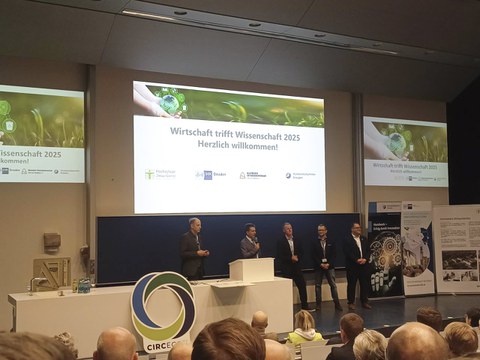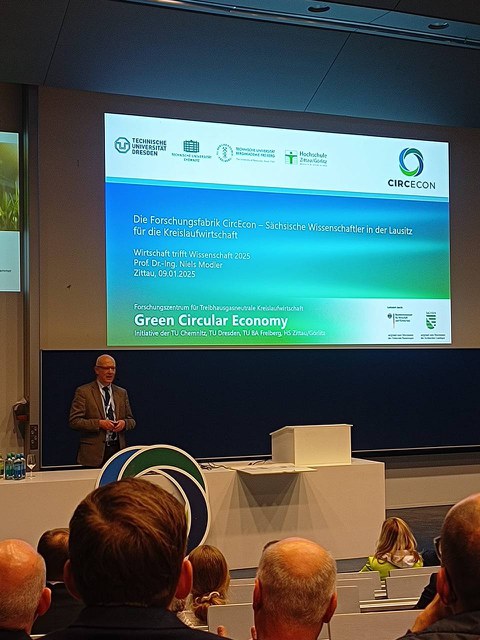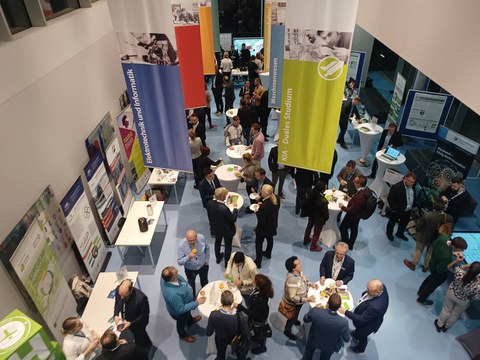Jan 10, 2025
CircEcon meets business: Cycles of the future at "Business meets Science" 2025

"Business meets science" 2025.
Under the theme "Recyclates as Growth Drivers – Potentials for the Lusatian Economy," the Zittau/Görlitz University of Applied Sciences, in cooperation with the Dresden Chamber of Commerce and Industry, the General Business Association Zittau and Surroundings e.V., and the Dresden Chamber of Crafts, organized the latest edition of the event series "Economy Meets Science" yesterday.
The event focused on key issues related to strengthening regional economic cycles through the use of recycled materials from industrial waste and residual materials. It served as a platform for interdisciplinary exchange, practical insights, and innovative thinking.

Prof Dr Niels Modler in his lecture.
The central questions addressed during the event were: "Local Circular Economy – an outdated idea or a step in the right direction?" and "What new business models can emerge from this in the region? Also: How can regional economic cycles and businesses benefit from this?" The keynote lecture by Prof. Dr. Niels Modler, board member of the Institute for Lightweight Engineering and Polymer Technology (ILK) at the TU Dresden, provided participants with an in-depth insight into the work of the CircEcon research factory, a major joint project of TU Dresden, TU Chemnitz, TU Bergakademie Freiberg, and Zittau/Görlitz University of Applied Sciences. Through its work, the initiative is implementing concrete measures to make the recycling of waste materials more sustainable, while at the same time unlocking economic potential for Lusatia. The project combines state-of-the-art research competencies in recycling, circular economy, and material processing and offers a unique demonstration facility in the Schwarze Pumpe industrial park in Lusatia. The goal is to close the entire value chain from raw material extraction through reprocessing to re-production in a climate-neutral manner. Pilot lines, test plants, and demonstration systems are being built in the CircEcon project to bring innovative approaches to efficient circular economy to market maturity together with companies. State-of-the-art methods such as artificial intelligence, digitalisation and energy management play a central role here.

Business meets science 2025.
After the keynote speeches, discussions at bar tables in the foyer provided an opportunity for in-depth dialogue. Scientists from the CircEcon research factory and representatives from industry and academia discussed opportunities for collaboration and practical applications of the approaches presented. In addition, participants gained insights into other initiatives, such as Bündnis Lausitz - Life & Technology, Saxony5, CIRCULAR saxony, and neo.NET e.V., which demonstrate how scientific innovations can be translated into concrete economic and regional added value.
The event emphasised the relevance of the targeted use of recyclates for the promotion of ecological and economic potential in structurally weak regions that are affected by significant economic upheaval. She emphasised the importance of close cooperation between science, industry and regional players in order to successfully master the challenges of the circular economy and at the same time create new growth impulses for the Lusatian economy.
In conclusion, we would like to thank the organizers, especially our CircEcon partner, the Hochschule Zittau/Görlitz, for an insightful and forward-thinking evening. We look forward to continuing the 'Business meets Science' series of events and the further discussions and collaborations that will result from this initiative.
Further information on CircEcon: Green Circular Economy (CircEcon)
